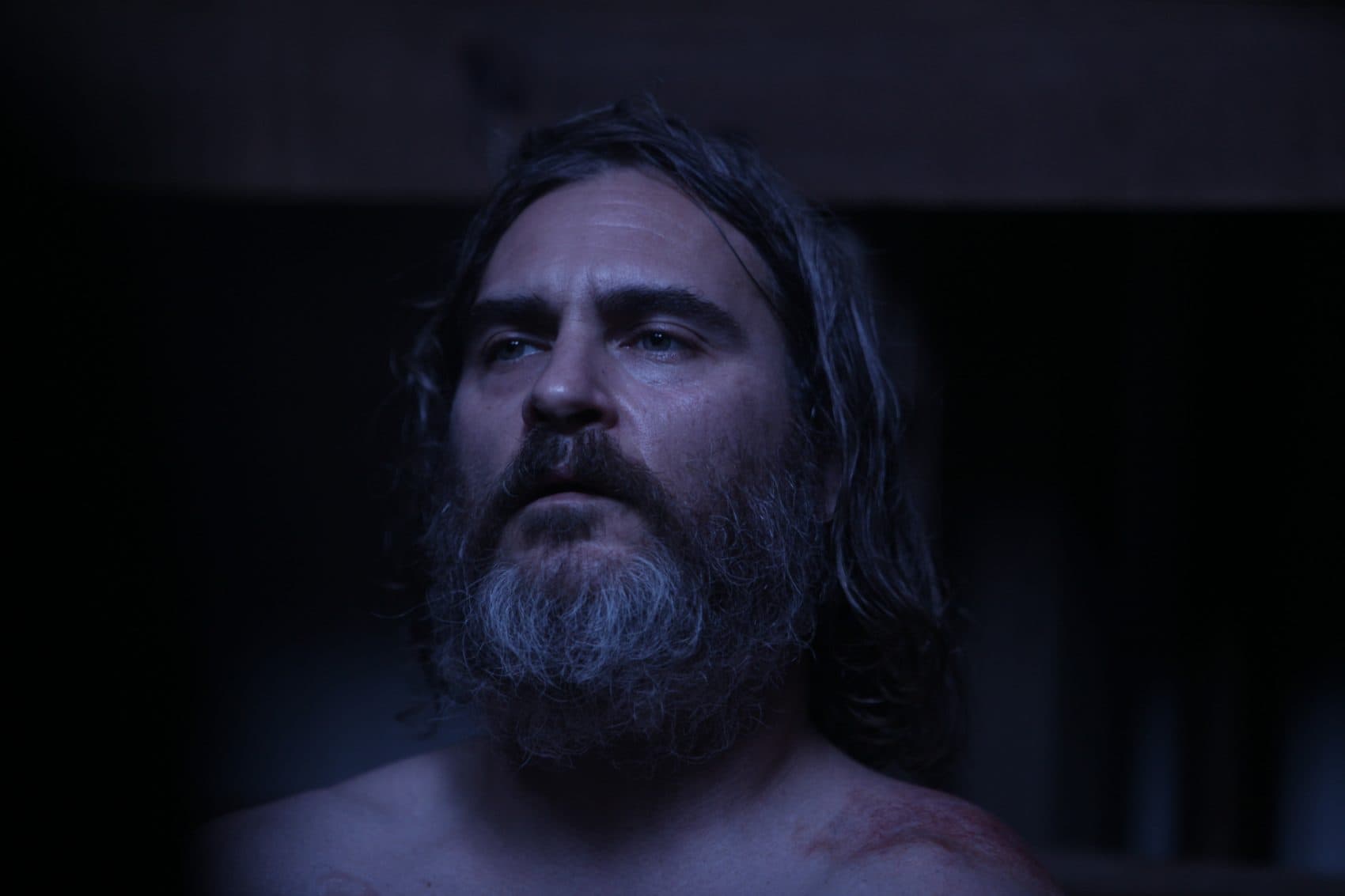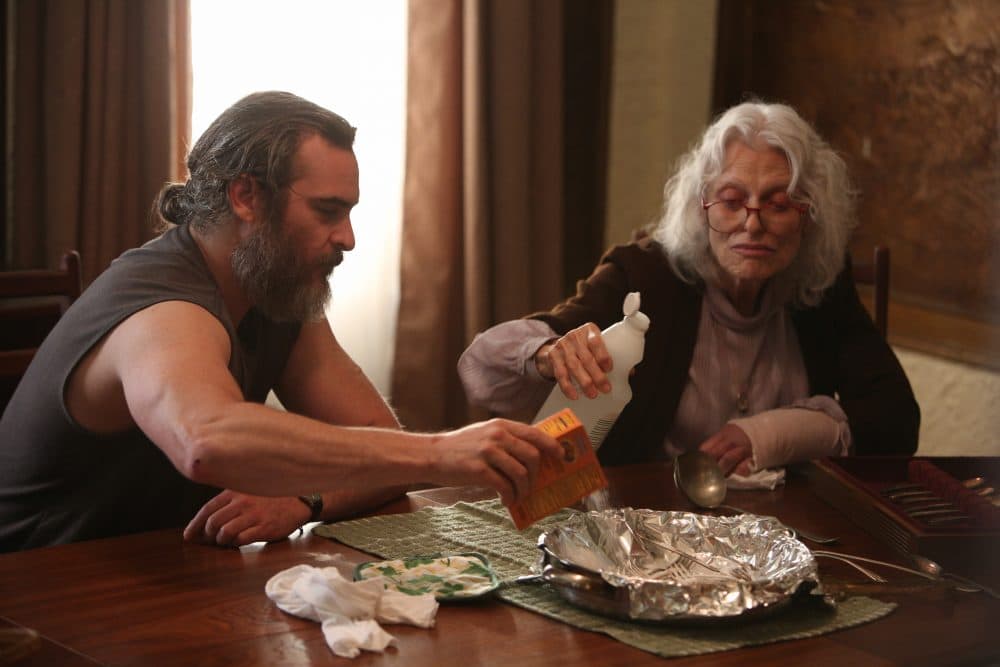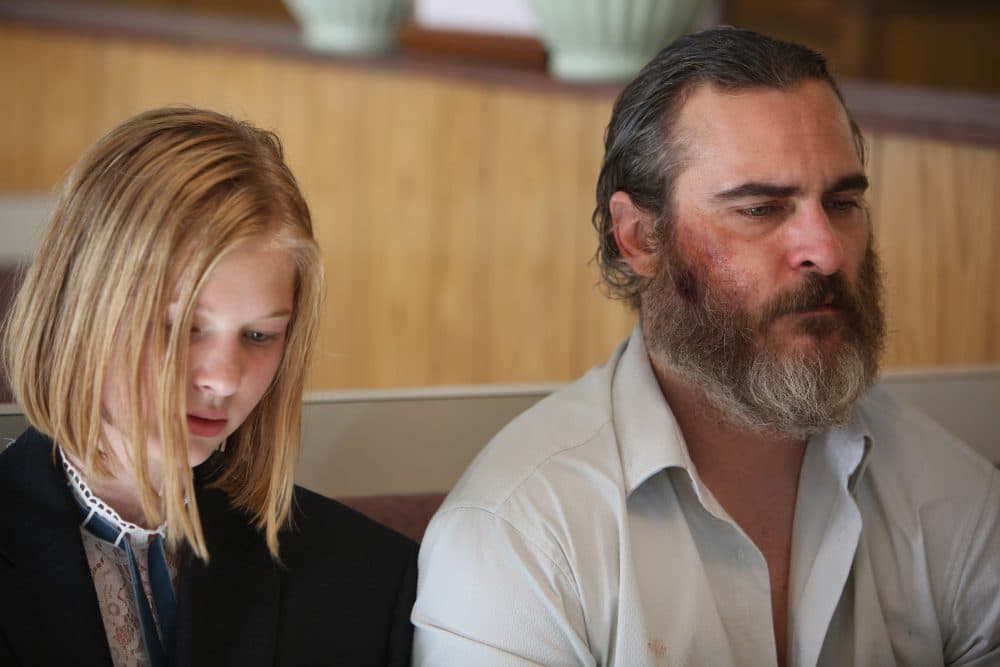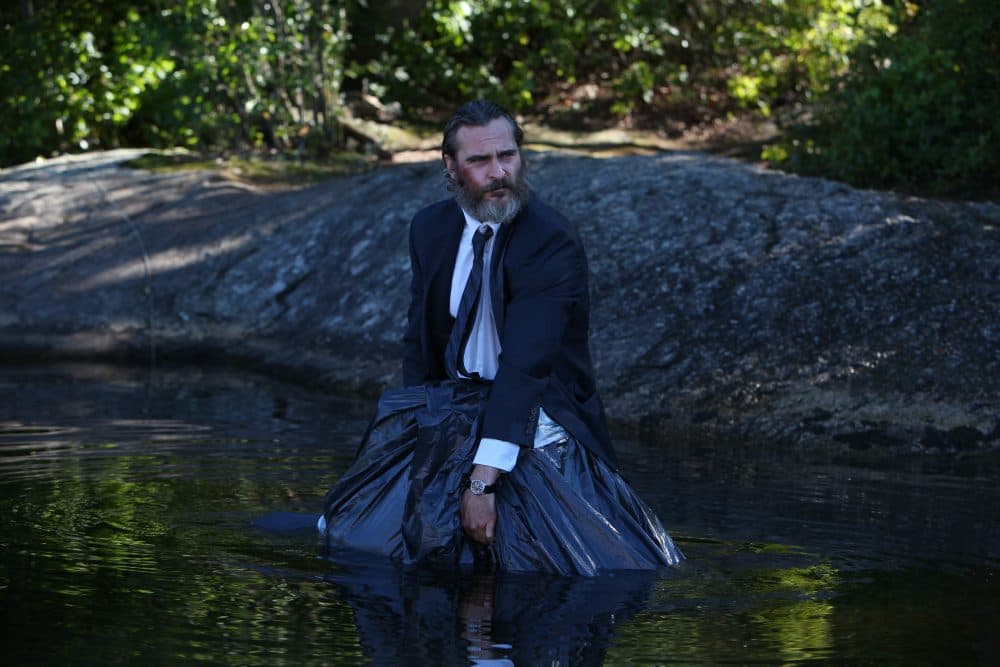Advertisement
Review
'You Were Never Really Here' Is A Bone-Rattling, 90-Minute Panic Attack

Writer-director Lynne Ramsay’s “You Were Never Really Here” is a bone-rattling, 90-minute panic attack that sends you staggering out of the theater in a daze. The first thing I did after emerging dumbstruck from an 8:30 a.m. screening at this past January’s Sundance Film Festival was start making plans to see it again. (I usually never watch movies for a second time at festivals, but this thing is such a monster I couldn’t resist.)
It’s a nerve-shredding, artsploitation action picture, with Ramsay mixing and matching elements of Martin Scorsese’s “Taxi Driver” and John Boorman’s “Point Blank” to create something audaciously all her own. “You Were Never Really Here” is an icky, rotgut noir filtered through a prism of abstract art. It’s like a Charles Bronson movie directed by Alain Resnais.
A thickened-out, slab-like Joaquin Phoenix stars as Joe Rogers, a frazzled Afghanistan Veteran suffering from what appears to be a massive case of PTSD. When not doting on his ailing, elderly mother — the two playfully riff on “Psycho” to sum up their relationship — Joe finds missing kids for cash, working for a mysterious fixer (John Doman) and meeting contacts out of the backs of bodegas or determinedly non-descript New York office buildings. He calls himself a hired gun, but a ball-peen hammer is Joe’s weapon of choice.

What’s immediately arresting is the way Ramsay shoves us into her protagonist’s shattered perspective. “You Were Never Really Here” is shot through the erratic eyes of its unreliable narrator, always infusing stray details with paranoid portents or just drifting away into distraction. (Phoenix spends an important expository scene sorting through a handful of jelly beans, trying to find a green one.) Jonny Greenwood’s eclectic score jerks from ethereal synths to pizzicato strings, mixed with an artfully cacophonous sound design of industrial noises and muffled murmurs. It’s deliberately destabilizing. We’re locked inside Joe’s head with him, aching for a moment’s peace.
A sleazy state senator’s daughter (Ekaterina Samsonov) has been kidnapped by an upscale sex-trafficking ring run out of a tony Manhattan townhouse. (“I want you to hurt them,” the politician tells our protagonist.) So it’s early in the film that Joe winds up re-enacting Travis Bickle’s climactic whorehouse massacre from “Taxi Driver,” but Ramsay pointedly veers away from Scorsese’s Grand Guignol purge. The rescue is depicted in silence, via a series of pixelated black-and-white security cameras that always cut in a moment or so too early or too late to catch Joe in action. All of the sudden there’s just a naked man lying dead on the hallway floor and a blurry shape moving through the shadows. You feel like you see a lot more violence in this movie than you actually witness.

Of course the senator’s missing daughter is just the beginning of vast conspiracy that stretches all the way to Albany and the governor’s mansion, in a deliberately vague plot that’s presumably more parsed out in the Jonathan Ames novella on which Ramsay’s screenplay is based. The film is far less interested in where Joe’s going than in what’s driving him there. Shocking splinters of flashbacks intrude throughout, providing jagged glimpses of grisly wartime atrocities and harrowing hints of domestic abuse. Joe is tormented by all the women he couldn’t save, and he sees signs of them all around him, every day. In moments of extreme duress he suffocates himself with a dry cleaning bag, as if re-enacting his most damaging childhood trauma might finally exorcise its aftereffects.
The prickly, Glaswegian Ramsay has long been preoccupied with such traumas, and at times “You Were Never Really Here” feels like a macho cousin to her 2002 masterpiece, “Morvern Callar,” which starred Samantha Morton as a Scottish supermarket worker sent reeling from her boyfriend’s sudden suicide under the Christmas tree. It’s a movie about the mysterious and impulsive ways grief can manifest itself, with Morton giving a performance as mesmerizingly unpredictable as the work Phoenix delivers here.
Beefed-up and barely recognizable beneath a bushy beard, the actor continues to stake his claim as one of the most fascinating figures in modern movies. It’s impossible to imagine “You Were Never Really Here” without Joaquin Phoenix because there’s always so much stuff roiling around inside this guy, and nobody’s better right now at being expressively inarticulate. I’d guess that maybe only two-thirds of Joe’s dialogue is even audible beneath the movie’s assaultive sound design, yet it matters not a whit as Phoenix has already drawn us so deeply into the character’s private hell.

The film moves with such propulsive, pulpy muscle you almost don’t notice how deftly Ramsay undercuts the story’s more salacious elements. There’s obviously an element of masculine fantasy to the tragic hero with a hammer rescuing little girls from big, bad men, but the action scenes are edited (with the help of frequent Werner Herzog collaborator Joe Bini) in a way that deliberately denies the audience any catharsis. Nobody’s getting their rocks off on the mayhem here, and even the post-Tarantino cliché of a kitschy ‘70s AM hit incongruously accompanying an act of bloodshed gets subverted into a bizarrely moving and compassionate moment set to pop singer Charlene’s cheeseball anthem “I’ve Never Been to Me.”
What will haunt you for days afterward are Ramsay’s fleetingly sinister images: a Chinese tourist’s rictus selfie-grin, window cross-beams like white crosses guarding the governor’s mansion, a blood-spattered diner waitress dropping the check, or Phoenix crushing that green jellybean between his meaty fingers. The closing credits follow a rare moment of solace, but listen closely and you’ll hear that Greenwood’s soothing score has been mixed with faint, murmuring voices. The voices never go away.
